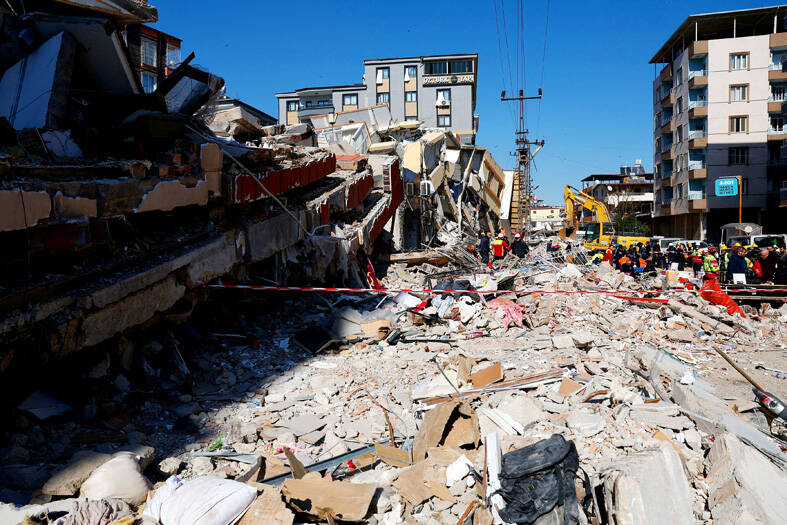How long can trapped people survive in the rubble of an earthquake?
Up to a week or more, experts say, but it depends on their injuries, how they are trapped and weather conditions.
Search teams from around the world have joined local emergency personnel in Turkey and Syria to look for victims from this week’s devastating earthquake that has killed thousands.

Photo: Reuters
Most rescues occur in the first 24 hours after a disaster. After that, survival chances drop as each day passes, experts say. Many victims are badly injured or buried by falling stones or other debris.
Access to water and air to breathe are crucial factors, along with weather. Wintry conditions in Syria and Turkey have hampered rescue efforts and temperatures have dipped well below freezing.
“Typically, it is rare to find survivors after the fifth to seventh days, and most search and rescue teams will consider stopping by then,’’ said Jarone Lee, an emergency and disaster medicine expert at Massachusetts General Hospital. “But, there are many stories of people surviving well past the seven-day mark. Unfortunately, these are usually rare and extraordinary cases.’’
People with traumatic injuries, including crush injuries and limb amputations, face the most critical survival window, said George Chiampas, an emergency medicine specialist at Northwestern University’s Feinberg medical school.
“If you don’t pull them out in one hour, in that golden hour, there’s really a very low chance of survival,’’ he said.
Those with other illnesses, whose health depends on medications, also face grim chances, Chiampas said.
Age, physical and mental condition are all critical.
“You see a lot of different scenarios where we’ve had some some really miraculous saves and people have survived under horrible conditions,” said Christopher Colwell, an emergency medicine specialists at the University of California, San Francisco. “They tend to be younger people and and have been fortunate enough to find either a pocket in the rubble or some way to access needed elements like air and water.’’
After the 2011 Japan earthquake and tsunami, a teenager and his 80-year-old grandmother were found alive after nine days trapped in their flattened home. The year before, a 16-year-old Haitian girl was rescued from earthquake rubble in Port-Au-Prince after 15 days.
Mental state can also affect survival. People trapped next to bodies, who have no contact with other survivors or rescuers, may give up hope, Chiampas noted.
“If you have someone who is alive, you’re leaning on each other to keep fighting,’’ he said.

On April 26, The Lancet published a letter from two doctors at Taichung-based China Medical University Hospital (CMUH) warning that “Taiwan’s Health Care System is on the Brink of Collapse.” The authors said that “Years of policy inaction and mismanagement of resources have led to the National Health Insurance system operating under unsustainable conditions.” The pushback was immediate. Errors in the paper were quickly identified and publicized, to discredit the authors (the hospital apologized). CNA reported that CMUH said the letter described Taiwan in 2021 as having 62 nurses per 10,000 people, when the correct number was 78 nurses per 10,000

As we live longer, our risk of cognitive impairment is increasing. How can we delay the onset of symptoms? Do we have to give up every indulgence or can small changes make a difference? We asked neurologists for tips on how to keep our brains healthy for life. TAKE CARE OF YOUR HEALTH “All of the sensible things that apply to bodily health apply to brain health,” says Suzanne O’Sullivan, a consultant in neurology at the National Hospital for Neurology and Neurosurgery in London, and the author of The Age of Diagnosis. “When you’re 20, you can get away with absolute

May 5 to May 11 What started out as friction between Taiwanese students at Taichung First High School and a Japanese head cook escalated dramatically over the first two weeks of May 1927. It began on April 30 when the cook’s wife knew that lotus starch used in that night’s dinner had rat feces in it, but failed to inform staff until the meal was already prepared. The students believed that her silence was intentional, and filed a complaint. The school’s Japanese administrators sided with the cook’s family, dismissing the students as troublemakers and clamping down on their freedoms — with

As Donald Trump’s executive order in March led to the shuttering of Voice of America (VOA) — the global broadcaster whose roots date back to the fight against Nazi propaganda — he quickly attracted support from figures not used to aligning themselves with any US administration. Trump had ordered the US Agency for Global Media, the federal agency that funds VOA and other groups promoting independent journalism overseas, to be “eliminated to the maximum extent consistent with applicable law.” The decision suddenly halted programming in 49 languages to more than 425 million people. In Moscow, Margarita Simonyan, the hardline editor-in-chief of the